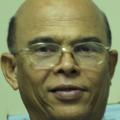The UDHR’s article 1 says: “All human beings are born free and equal in dignity and rights. They are endowed with reason and conscience and should act towards one another in a spirit of brotherhood.” But, U Win Tin, famous prisoner of conscience of Burma, cannot even enjoy its first item.
The UDHR’s article 7 and 9 say respectively: “All are equal before the law and are entitled without any discrimination to equal protection of the law. All are entitled to equal protection against any discrimination in violation of this Declaration and against any incitement to such discrimination.” (A.7)
“No one shall be subjected to arbitrary arrest, detention or exile.” (A.9)
However, the Burmese junta’s arbitrary court sentenced unfair imprisonments toward U Win Tin in the absence of public including his lawyer.
The UDHR’s article 19 says: “Everyone has the right to freedom of opinion and expression; this right includes freedom to hold opinions without interference and to seek, receive and impart information and ideas through any media and regardless of frontiers.”
But, several journalists including U Win Tin in the military run country are taken into custody for their dissident opinions.
U Win Tin is the world’s longest serving “prisoner of conscience” and “veteran journalist of Burma”.
Two press freedom associations, Reporters Without Borders and the Burma Media Association issued a statement calling for the release of the veteran journalist, who has spent 19 years in solitary confinement under the inhumane junta’s detention. His health has deteriorated in the past few days.
“It will be exactly 19 years on 4 July since Burma’s military arrested Win Tin,” the groups’ statement highlighted. “The government, which has a responsibility to protect the life of its citizens, should now release him,” it went on.
That famous imprisoned journalist has constantly refused to sign a confession promising to abandon his political career as a condition of his release. The 79-year-old journalist admitted to the hospital for second surgical treatment to a hernia in January 2008. The first surgical treatment to his hernia was in March 1995. (Note: You can view every article as one long page if you sign up as an Advocate Member, or higher).
Former editor-in-chief of The Hantharwaddy Daily of Mandalay was awarded the UNESCO/Guillermo Cano World Press Freedom Prize, the World Association of Newspapers' Golden Pen of Freedom Award and Reporters without Border/Foundation de France Prize for his efforts to defend and promote freedom of expression.
Burma has been called “the world's largest prison for prisoners of conscience” including political prisoners and journalists. Burma’s distinguished prisoner of conscience, U Win Tin is one of Burma's most established journalists and executive member of the National League for Democracy (NLD). He has spent 19 years or one fourth of his life in prison. U Win Tin suffers from a serious heart condition and is being treated at the Rangoon General Hospital where he is confined to a tiny box-cell designed for political prisoners.
U Win Tin has been imprisoned since 4th July 1989 in a special cell of the infamous Insein Prison in Rangoon. U Win Tin is the former editor-in-chief of the Hanthawadi Daily, in Mandalay and vice-president of the Burmese Writers and Journalists Association. He was convicted and sentenced to three consecutive prison-terms to a total of 21 years in prison. One of the charges against him stems from his 1995 human rights abuses report in prison to Mr. Yozo Yokota, the then United Nations Special Rapporteur for the Situation of Human Rights in Burma..
U Win Tin was also imprisoned because of his senior position as key consultant to Aung San Suu Kyi, leader of the National League for Democracy (NLD). He was thrown into jail for additional years because of attempting to inform the United Nations about human rights violations in prisons under the military rule. Military rulers also accused him of writing political commentaries and poems to be circulated among political prisoners in Insein Prison, where possession of writing materials was forbidden.
The journalist told a friend who was allowed to visit him in 2007: "Two prison officers asked me at a special meeting last week whether I would resume political activities if I were released. I told them that I will definitely do so since it is my duty as a citizen to strive for democracy."
In 1996, in the notorious Insein Prison, the military intelligence personnel regularly visited U Win Tin in order to examine his political stand. They took him to their office in the prison and questioned him on various topics. They frequently tried to persuade him to join the junta. But U Win Tin always turns down their offers.





